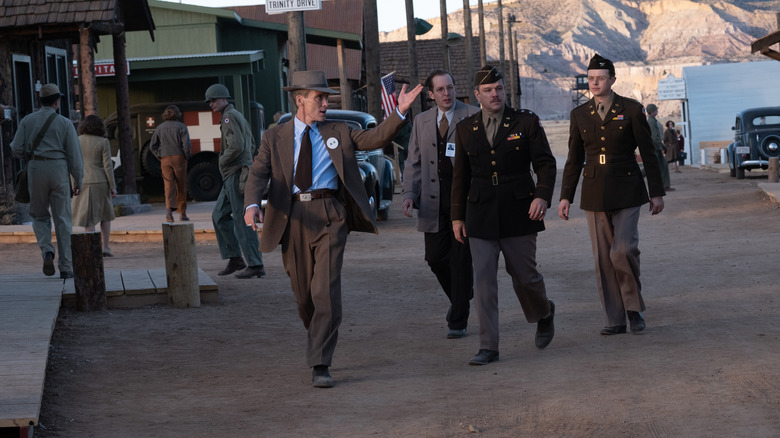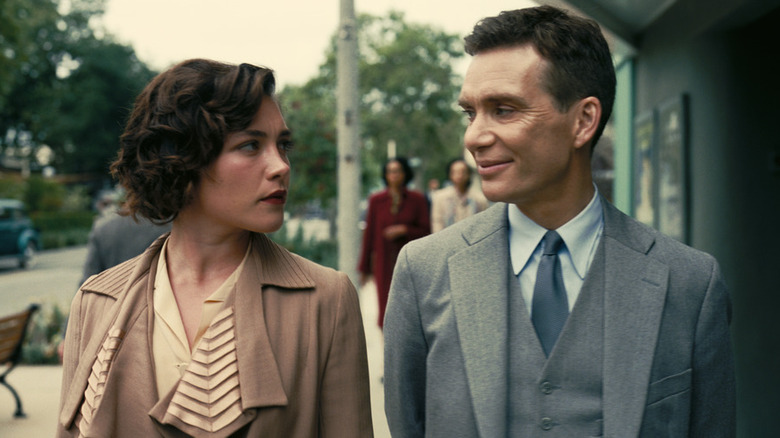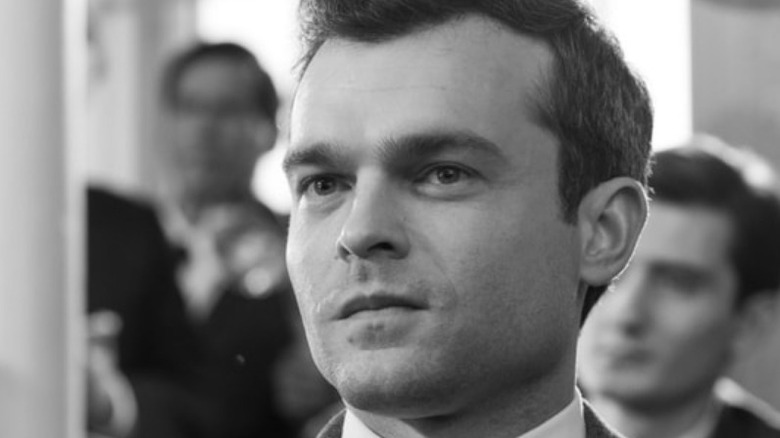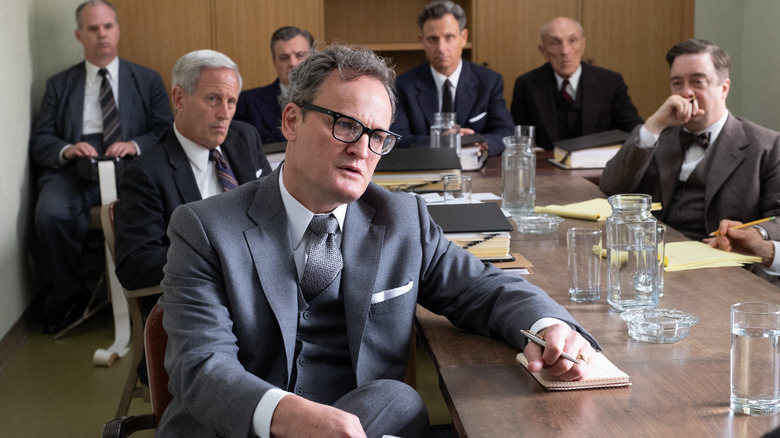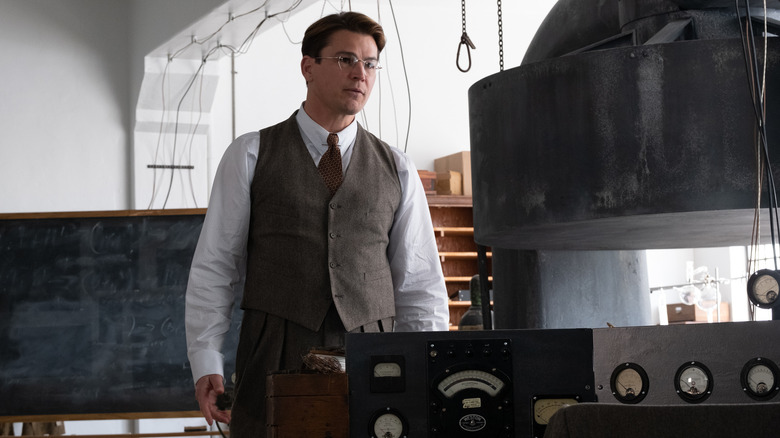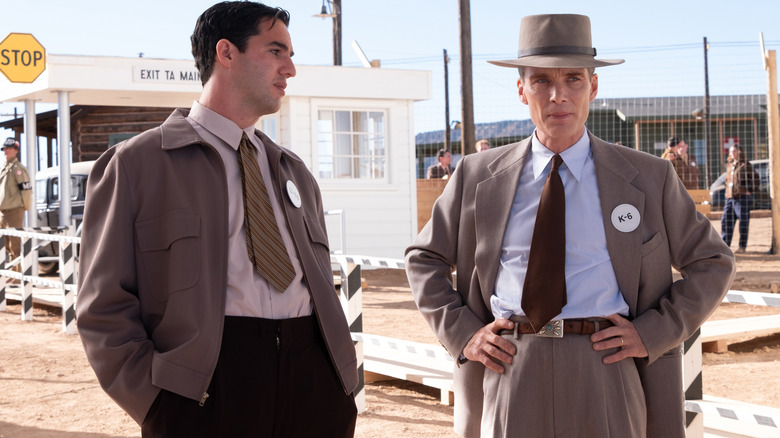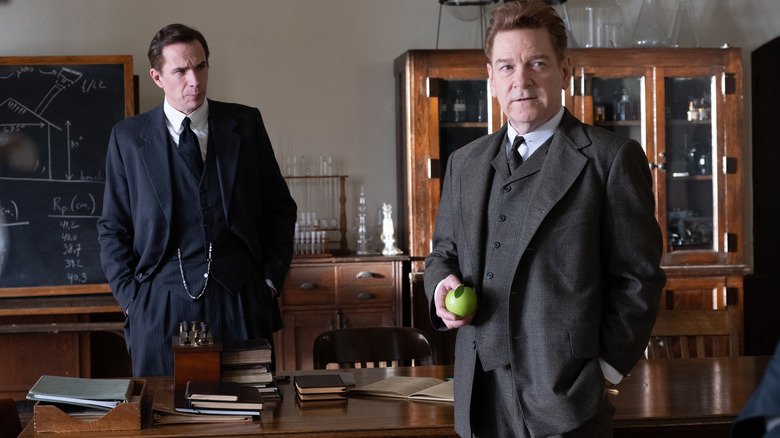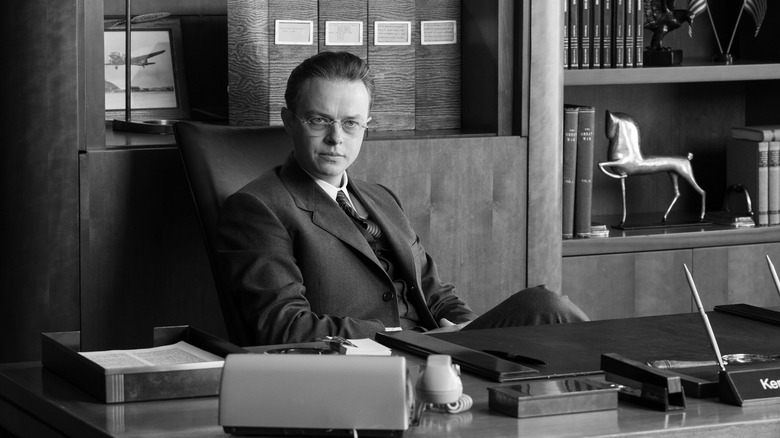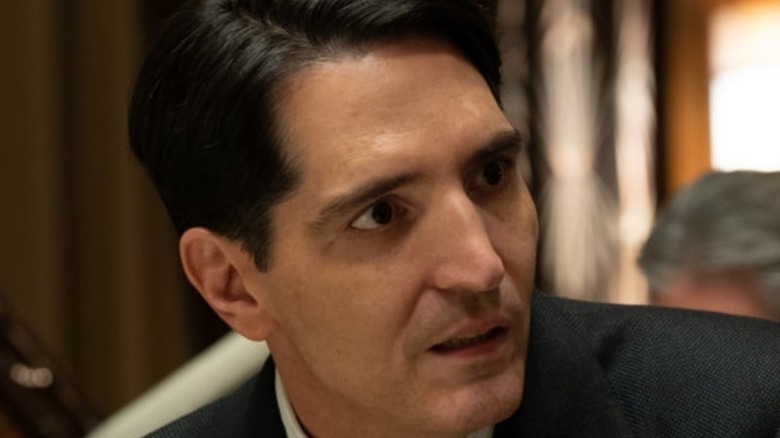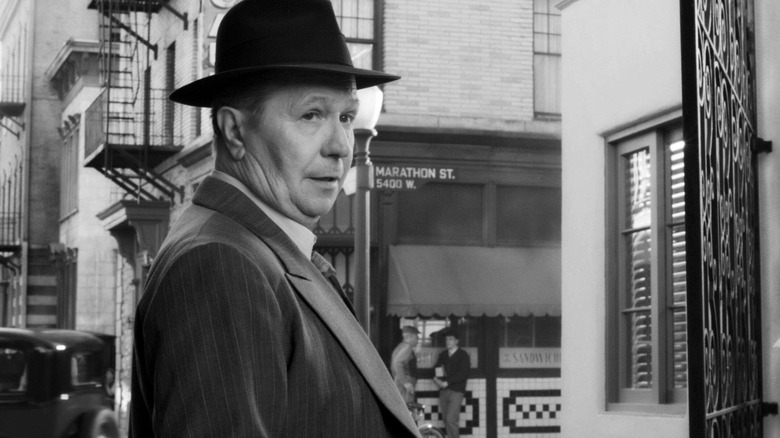The Oppenheimer Supporting Character Guide: Your Guide To All 'Those Guys'
Christopher Nolan's latest film has only one man's name in the title, but don't let that fool you. Although "Oppenheimer" has been marketed as a straightforward biopic (albeit one involving claims of recreating an atomic bomb explosion without the use of CGI) about the most Nolan-y of concepts — a profoundly conflicted white man tasked with carrying the weight of the world on his shoulders — the film is a testament to teamwork. That's largely due to the filmmaker somehow managing to take every major and minor historical figure from the film's source material, the 2005 biography "American Prometheus" by Kai Bird and Martin J. Sherwin, and squeeze them into a three-hour runtime that flies by at a blistering pace. At a certain point, it almost feels like an adaptation with an ensemble cast as sprawling as this should collapse under its own weight, but there's a very easy explanation for why that never happens.
Apparently, casting an avalanche of A-list actors for practically every supporting role will go a long way towards keeping audiences invested in an otherwise extraordinarily busy epic. Nolan said as much in a recent profile with Vulture, explaining his refusal to streamline certain individuals from the book and combine them into composite characters, as is typically common practice in countless adaptations. Instead, each one stands alone and serves their own important narrative purpose — even when it's only for a handful of key scenes.
Despite a host of famous faces embodying these roles, audiences might still find themselves a little overwhelmed by the bevy of characters to keep track of. So with "Oppenheimer" finally set to drop into theaters, we figured an explainer might be in order. This guide remains spoiler-free, although it does delve into historical context, so approach with whatever degree of caution feels right for you.
Florence Pugh as Jean Tatlock
Let's start with the most popular actor of them all, shall we? Florence Pugh has exploded into mainstream success thanks to the one-two-three punch of "Midsommar," Greta Gerwig's recent "Little Women" remake, and her scene-stealing turn in Marvel's "Black Widow." But it's fair to say she's never had a role quite like this one, forcing her to make the absolute most of very limited screen time. Luckily, she's more than up to the task.
Pugh portrays Jean Tatlock, based on the real-life figure who was a psychiatrist, a young firebrand with strong ties to the Communist party, and an early love interest of Oppenheimer's (Cillian Murphy) well before the start of the Manhattan project. Although it's hardly a spoiler to say their relationship doesn't exactly end well (Emily Blunt plays Oppenheimer's wife Kitty, after all), Jean casts an immensely long shadow throughout Oppenheimer's life. Yes, the noticeable age gap between the two actors has caused a bit of an online stir, but it also reflects the 10-year difference between the two historical figures — Jean was only 22 when she began her tryst with the brilliant scientist.
Countering Oppenheimer's intimidating grasp of quantum mechanics with Jean's own deep passion for literature and poetry, they made for an unlikely pair during a tumultuous time in both American history (having first met in 1936) and their own personal lives. Tatlock suffered from depression, which was only exacerbated by FBI surveillance as McCarthyism took root in the country. Oppenheimer's extended absence to oversee the Manhattan Project in Los Alamos only made things worse. Decades later, details of Oppenheimer's relationship with Jean would come back to haunt him (and Kitty) as Jean's Communist Party membership led to the US government's attempts to revoke his security clearance in the 1950s.
Alden Ehrenreich as a senate aide
Many will undoubtedly come away from "Oppenheimer" convinced that Robert Downey, Jr.'s performance as politician, Chairman of the Atomic Energy Commission, and chief Oppenheimer rival Lewis Strauss steals the whole show — and they would be absolutely correct. But Alden Ehrenreich, as an unnamed senate aide, ought to get as much credit as anyone in the film. The "Solo: A Star Wars Story" and "Hail, Caesar!" star appears in the film strictly in the black-and-white timeline that covers Oppenheimer's 1954 security hearings. While he never actually crosses paths with Cillian Murphy throughout the film, his biggest function in the story is as an underling caught up in the gravitational pull of Strauss' one-man campaign against Oppenheimer. The grudge between the two figures dates back to their days at the Institute for Advanced Study in the late 1940s, which curdles into a full-blown war of words a decade later when Oppenheimer casually adds insults to injury.
Although never named in the film, Ehrenreich seems to portray an amalgamation of various unfortunate individuals from the book who became caught up in (and promptly steamrolled by) Strauss' political ambitions. In effect, Nolan manages to use the character to represent a cautionary tale of what happens when politicians care little about the collateral damage they cause. It's easy to see why Nolan would cast someone of Ehrenreich's talents in such a small but pivotal role, given how much of the character's allegiances and conflicts with Strauss take place internally. As soon as the actor arrives on the scene without much fanfare, viewers would be well-advised to take note and keep a close eye on his subsequent appearances throughout the movie.
Jason Clarke as Roger Robb
For a movie as giant-sized as "Oppenheimer," one main antagonist simply isn't enough. Nolan cast Jason Clarke in another supporting role that could've come across as perfunctory in less capable hands. Instead, his portrayal of special counsel Roger Robb during Oppenheimer's security clearance hearings presents a formidable obstacle to the so-called "Father of the Atomic Bomb." Robb is remembered in history as a fierce attorney, a staunch conservative, and a relentless courtroom presence who fully exploited the fact that these hearings were conducted privately and purposefully out of the public eye. Under his withering cross-examination, Robb was specifically chosen to orchestrate the downfall of Oppenheimer's reputation on behalf of a government that had begun to turn their backs on their most prized scientific mind during World War II.
As for the film itself, these extended sequences provide the opportunity for one name-brand actor after another to truly flex their acting muscles while on the stand, from Murphy to Blunt to Benny Safdie — but not least of all Clarke. Traditionally cast as more rough-and-tumble characters to take advantage of his rugged features, the actor finds the perfect outlet for this very specific energy in "Oppenheimer." Despite a fairly straightforward enough function in the script, Clarke stands out as one of the most effective examples of taking an inherently unlikable character and allowing a performer whom audiences are generally familiar with to bring him to life.
Josh Hartnett as Ernest Lawrence
No, your eyes do not deceive you. Heartthrob Josh Hartnett of "The Virgin Suicides" and "Pearl Harbor" fame truly does walk into "Oppenheimer" with a flourish, as if Nolan were filming Samuel L. Jackson's cameo at the end of "Iron Man." And, honestly, he deserves it.
Having parlayed his early success into a surprisingly varied filmography, Hartnett proved to be one of Nolan's shrewdest castings for his latest movie. Here, he plays a role unlike anything fans might have expected. As an accomplished nuclear physicist and professor at Berkeley, Ernest Lawrence crossed paths with Oppenheimer very early on and remained an integral member of the Manhattan Project from practically the very beginning. Described in "American Prometheus" as "everything that Robert Oppenheimer was not," Hartnett's appearance in the movie quickly bears that out — square-jawed, towering, and as traditionally American as it gets.
Of course, that means it should come as no surprise that Oppenheimer's heavy focus on theory and his unabashed views on Communism would occasionally set the two colleagues and friends at odds with one another. The film largely follows history in this regard, although it also goes out of its way to depict both as brilliant minds in their own right ... even as they disagree profoundly over their respective politics. That said, the true highlights of their dynamic comes during the thick of the Manhattan Project in New Mexico. This is only one of the many complicated and, at times, contentious relationships that Oppenheimer fosters over the course of the story. But with such a surprising choice as Hartnett, Nolan finds an actor more than capable of standing toe-to-toe with Murphy.
Benny Safdie as Edward Teller
Exactly how jam-packed is Nolan's latest, you ask? Not only did he wrangle one of the most stacked casts in any major blockbuster since, well, "Barbie," but he even dipped into the filmmaking pool to round out his ensemble. Movie aficionados won't fail to notice Benny Safdie's unmistakable presence in "Oppenheimer," having co-directed hits such as "Good Time" and "Uncut Gems" alongside impressive acting roles in "Licorice Pizza," "Obi-Wan Kenobi," and "Are You There God? It's Me, Margaret." In "Oppenheimer," Safdie effortlessly slides into the character of Hungarian-American theoretical physicist and "Father of the Hydrogen Bomb" Edward Teller.
Oppenheimer recruited Teller fairly early on in the process of gathering names for the Manhattan Project, making him an expert among experts — with an ego to match. Various trailers for "Oppenheimer" show him butting heads with Oppenheimer and even attempting to leave the super-secret Los Alamos community in a huff, bristling under the immense pressure and the abrasive interactions of stubborn colleagues with very different points of views on his work. All that audiences need to know about Teller is that his hard-earned title is no exaggeration, having planted the seeds for nuclear warfare on a mass scale even as Oppenheimer raced against the clock to build the atomic bomb before the Nazis did.
The film opens with title cards specifying fission vs fusion — an extremely Nolan thing to do, granted, but an important distinction that ultimately factors into Teller's theories of his "super" bomb. Oh, and remember that memorable line in the trailer about how detonating the bomb could have a "near-zero" chance of ending the world as we know it? History can thank Teller for coming up with those terrifying calculations in the first place.
Kenneth Branagh as Niels Bohr
Michael Caine, Tom Hardy, and Cillian Murphy tend to stand out the most as the most frequent acting talent to collaborate over and over again with Christopher Nolan, but let's not overlook Kenneth Branagh. Another filmmaker/actor in "Oppenheimer," Branagh follows up roles in "Dunkirk" and "Tenet" to appear as the famous Danish physicist Niels Bohr. If that name rings a bell, you probably remember him from your high school science classes during discussions of the atom. In "Oppenheimer," Branagh brings him to life as a mentor that Oppenheimer looks up to in profound awe.
The physicist factors into Oppenheimer's journey as early as 1923, when Bohr conducted a couple of lectures at Harvard that Oppenheimer made a point of attending. In the film, as in the book, Oppenheimer finds himself in hot water with a brief and wildly ill-advised moment of rage involving a cruel professor and a perfectly-placed apple. To go any further would spoil one of the movie's best moments, but Nolan adds another layer of irony by involving Bohr directly in the action and establishing his strong influence over Oppenheimer's life's work at an early age. In the capable hands of Branagh, Bohr comes across as a wise, gentle, and utterly knowledgeable mentor (in "American Prometheus," Oppenheimer is recorded declaring Bohr as "his God") who eventually becomes a peer. During WWII, Bohr unsuccessfully lobbied for the Americans to share their atomic research with their allies (particularly Russia) in the spirit of openness and unity to pool their resources.
In "Oppenheimer," the irony of Bohr winning a Nobel Peace Prize for his work in atomic radiation is commented upon, adding yet another level of complexity to an already compelling plot.
Dane DeHaan as Kenneth Nichols
Nobody can accuse Christopher Nolan of approaching casting with a one-size-fits-all perspective. Who would've ever tabbed Heath Ledger for the Joker in "The Dark Knight," for example? Others, like Michael Caine as Alfred, tend to follow a much more expected approach. "Oppenheimer" comes chock-full of choices on both sides of the aisle — Dane DeHaan's role firmly falls under the latter category. Repeatedly cast as either outright villains or darker protagonists with a razor-sharp edge to them, DeHaan's past work clearly got Nolan to sit up and take notice when he gave him the call to play Kenneth Nichols.
As an aide to Matt Damon's gruff military man Leslie Groves, Nichols suffered many indignities under the officer he refers to in "American Prometheus" as "...the biggest S.O.B. I have ever worked for." Appearing alongside Groves throughout the Los Alamos scenes in "Oppenheimer," constantly suspicious of the loose security and the very real possibility of leaks (or even outright espionage) from loose-lipped scientists, DeHaan's Nichols reappears later on in an even more significant role during the black-and-white timeline that predominantly deals with Oppenheimer's security clearance hearings. Later finding himself in a prominent position with the Atomic Energy Commission and harboring a vivid memory of Oppenheimer's loose cannon approach (not to mention those ever-present Communist connections), Nichols has more reason than most to insist upon revoking the world-famous scientist's clearance.
Needless to say, this is one role that DeHaan makes an absolute meal out of within an incredibly short amount of screen time.
David Dastmalchian as William Borden
You know what? Every word I just wrote about DeHaan could easily apply to David Dastmalchian, known best for his breakout role as a Joker thug in Nolan's "The Dark Knight." In the years since, the distinctive actor has played comedic characters, disturbing villains, and everything in-between. That range ultimately proved fitting for his role in "Oppenheimer," which refuses to box him into any one label in the sneakily layered role of William Borden, a former Air Force pilot and aide on the Joint Committee on Atomic Energy.
In "American Prometheus," the biography recounts Borden's lifechanging memory of seeing a German V-2 rocket whiz right by his aircraft during the London bombings of WWII. This inspired a healthy fear of widespread nuclear war in the future, with visions of Oppenheimer's atomic bomb technology affixed to each rocket and in the unstable hands of America's enemies. Although his early interactions with Oppenheimer left him impressed by his leadership abilities, their wildly different stances on nuclear advances steadily began to stoke his suspicions against Oppenheimer's motives. In no time at all, he found other likeminded individuals who had their own reasons to doubt Oppenheimer's sudden change of heart in the wake of the bombings of Hiroshima and Nagasaki.
Dastmalchian is tasked with a singularly complicated role in the film, forced to make an immediate impression when he first arrives and again when he pops up much later on in the three-hour epic. Consider this your reminder to keep Borden in the back of your mind throughout the picture.
Casey Affleck as Boris Pash
When I say that everyone is in this movie, I mean everyone. Casey Affleck's involvement in "Oppenheimer" was reported well in advance of release, but his face has remained noticeably absent from any of the marketing. That might imply a mere cameo or some other minor role of little import, but it's fair to say that his portrayal of military intelligence officer Boris Pash makes a strong impression throughout the film.
Although it isn't touched upon in the movie itself, the historical figure's background is absolutely fascinating. Born in California to a Russian Orthodox bishop and a Serbian, Pash actually served in the Russian army during WWI and took up arms against the Bolsheviks during the Russian Revolution. Upon returning to America, he enlisted in the Army Reserves and was eventually called to active duty in the years preceding America's involvement in WWII. There, he quickly rose up the ranks as a counter-intelligence officer with a specialty in investigating suspected spies for the Soviets — whom he considered to be America's greatest foe, even as they were considered tentative allies during the war. You can probably guess how Oppenheimer eventually ended up on his radar.
The film uses his unique career trajectory to its advantage, hyping up Pash as a wild card who uses alarming Russian tactics to get whatever info he might need. As Oppenheimer soon finds out for himself, anything said in his presence had better be double- and triple-checked for incriminating details. Pash is the mad dog yipping at the heels of Oppenheimer, adding yet another complication in a story that's absolutely rife with them.
Gary Oldman as Harry S. Truman
From one World War II leader to another. After portraying Winston Churchill in Joe Wright's "Darkest Hour," Gary Oldman decided to cross the pond and suit up as President Harry S. Truman for his old buddy Chris Nolan in "Oppenheimer." The exceedingly small role is little more than a cameo, to be fair, but audiences will quickly understand why such an imposing presence needed a talent like Oldman to make a real impact.
But first, a brief history lesson! Truman, of course, inherited the White House after the death of Franklin D. Roosevelt in 1945, just as the war in Europe was all but assured of an Allied victory. Nevertheless, Truman presided over some of the bloodiest moments in the entire Pacific arena, such as the various firebombing runs that completely destroyed entire swaths of major Japanese cities and killed hundreds of thousands of innocent civilians. "American Prometheus" goes out of its way to chronicle how such bloodshed against non-military targets was wholly unnecessary and how this preceded the coldblooded decision to use the atomic bombs as a pretext for America to display its military superiority — not just to an already-defeated Japan, but mainly to their Russian allies as leaders on both sides looked ahead to the impending Cold War. With Hitler already out of the picture and Nazism on the run, all of Oppenheimer's efforts to construct the bomb would seem to have been for nothing ... until focus shifted towards inflicting such weapons on Japan.
Much of this political intrigue and conspiracy runs in the background of "Oppenheimer," but Nolan refuses to shy away from the decision-making that led to dropping the bombs on Hiroshima and Nagasaki. In just one scene, Oldman shows just what kind of person Truman really was.
